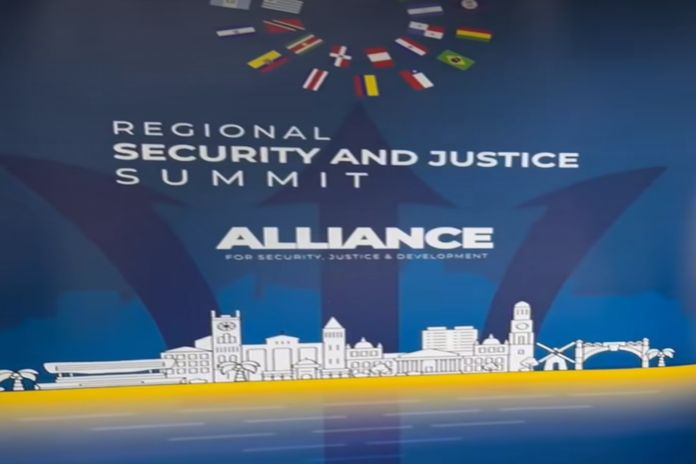BRIDGETOWN, Barbados, (GIS) – Prime Minister Mia Amor Mottley is calling for greater collaboration among the 18 countries that have signed on to the Alliance for Security Justice and Development in the wake of the rising incidence of crime across the region.
Prime Minister Mottley warned that the region could lose the battle against perpetrators of crime if its leaders failed to put up a united front against criminal activity.
The prime minister was speaking during the launch of the Latin America and the Caribbean Alliance for Security and Development and the Alliance’s Caribbean Chapter: One Safe Caribbean.
This occurred on day two at the government of Barbados and Inter-American Development Bank’s Regional Security and Justice Summit at Lloyd Erskine Sandiford Centre.
Mottley maintained that law-abiding citizens must see it as their responsibility to work with agencies involved in the crime fight, to work with the entities and the agencies who may treat to this as a “frontline” responsibility.
“The efforts of one country fighting a battle on crime or on the illicit flow of guns or the illicit flow of money will never work. What is required is the level of cooperation and alliance which we have come here today to settle and that the Caribbean chapter will emerge from here is consistent with the decisions of the CARICOM heads of government three weeks ago. If we do not resolve to ensure that we can work together as societies and as regional alliances, we will not make this journey together successfully,” Mottley stated.
The prime minister said the Alliance’s goals were cohesive with CARICOM’s as she cited her recent visit to Georgetown, Guyana, where the George Bridge Declaration was established to signal the collective response of regional leaders in tackling the problem.
Mottley also urged regional leaders not to allow crime to derail their efforts at tackling other pressing issues in their respective countries.
“There must be a determined effort day by day, … to ensure that crime and violence do not disrupt our societies, and do not dislocate or distract from the very other difficult issues that we face in bringing development to our people. We have agreed, for example, that there are aspects of this multidisciplinary fight that must be treated at the regional level and the hemispheric level,” Prime Minister Mottley said.
Meanwhile, president of the IDB, Ilan Goldfajn, said the bank was committed to assisting regional governments in fighting organised crime, considering the significant losses annually.
“Every year in Latin America and the Caribbean 3.4 percent of GDP is lost to the impact of crime. That is a big number, a staggering cost that drains economies and disrupts lives. Organised crimes account for nearly half of all homicides in the region and they are getting more sophisticated,” Goldfajn said.
Foreign Secretary of the United Kingdom, David Lammy, in his address stated that the British government will allocate £27 million in new funding in the region to build up law enforcement intelligence gathering capabilities in the Eastern Caribbean to better equip law enforcers to “take on the criminals and to support public campaigns discouraging individuals from turning to violence.”
“We will give £5 million specifically to your vulnerable Caribbean Fund to strengthen institutions like CARICOM and the Regional Security System. Through these bilateral agreements and long-standing work of our diplomats and law enforcement officers, we are making life hard for the criminal gangs,” Lammy underlined.
During the ceremony, there were also remarks from attorney General Dale Marshall; president of the alliance and minister of the interior in Ecuador, Mónica Palencia; and deputy prime minister and the minister of national security of Jamaica, Horace Chang.

